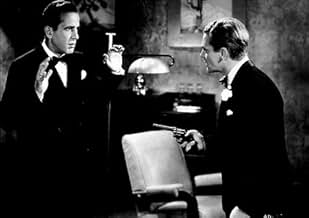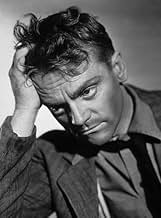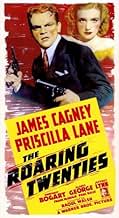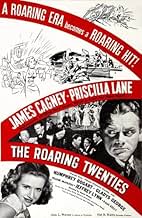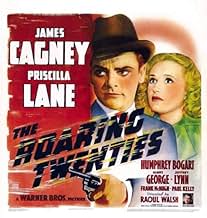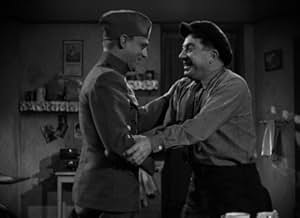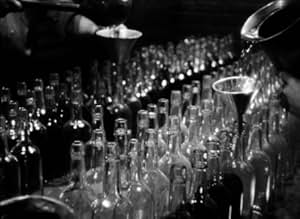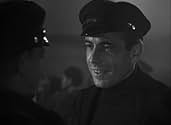CALIFICACIÓN DE IMDb
7.9/10
17 k
TU CALIFICACIÓN
Tres hombres intentan ganarse la vida en la América prohibicionista tras volver a casa después de luchar juntos en la Primera Guerra Mundial.Tres hombres intentan ganarse la vida en la América prohibicionista tras volver a casa después de luchar juntos en la Primera Guerra Mundial.Tres hombres intentan ganarse la vida en la América prohibicionista tras volver a casa después de luchar juntos en la Primera Guerra Mundial.
- Dirección
- Guionistas
- Elenco
- Premios
- 4 premios ganados en total
Elisabeth Risdon
- Mrs. Sherman
- (as Elizabeth Risdon)
Edward Keane
- Henderson
- (as Ed Keane)
Eddy Chandler
- Second Detective
- (as Eddie Chandler)
John Deering
- Narrator
- (voz)
Opiniones destacadas
A spell of time spent on the front in World War One, leads to a life of opportunity and fun, as a decade makes an entrance, rules of the game become song and dance, with some liquor, a bit of conflict and some guns. Prohibition creates possibilities, to entertain the crowds in so called speakeasies, brewing spirits then creates, the drinks the Volsted Act just hates, though drinking too much might make you, a bit queasy. Alas new Presidents curtail the operations, meaning that changes come to all organisations, markets sink, then fall, decline, your social status realigns, in the end, was it all worth it, you will opine.
Sometimes I come to a film because it looks like it can directly fulfill, sometimes because it can provide precious background to other things that matter, letting them stand.
It's watchable in itself, this one; a misfit's rise and fall played against the passing of times. Released on the cusp of WWII, it opened a portal back to more careless times, taking us on a journey from WWI trenches through the highs of Prohibition to the lows of Depression, so we could have this clear moral stance: in the new world there's no room for scoundrels. Right.
Interesting here is that only a year or two before Citizen Kane we have a similar saga about the passing of the times, but one that asks no fundamental question of us, casts no doubt on its testimony. It's as lurid and constructed as newspaper headlines of the time, a main contrast in Welles' film about its world-creating newspaperman. It's machinegun history written in the staccato sounds of a newspaperman's typewriter.
What I really wanted to see though was Cagney.
I am in the middle of a film noir quest looking for its machinery, and as an aside I was brought to explore its roots in 1930's crime stuff. Cagney is a force in this niche. He had so much energy that he could turn into presence. He is not just amused, he doesn't coast on pushing things back like Bogart; he throws himself on the encounter, bitterly cutting himself on the edges.
Not so here. He was asked to play a basically decent guy led astray by the prospect of easy money, meaning to reflect the broader American endeavor that ended on Black Tuesday. Usually in a Cagney film he lets loose in the end. They asked of him here the precise opposite; he sleepwalks, numbed by failure, a human ruin clawing at redemption. He looks like he gives it his all, but it's just not who he is. It's as if you asked Welles to strut like Wayne.
If you want to see Cagney in top form, look him up in Footlight Parade fully in command of a show, White Heat to see him face real demons.
It's watchable in itself, this one; a misfit's rise and fall played against the passing of times. Released on the cusp of WWII, it opened a portal back to more careless times, taking us on a journey from WWI trenches through the highs of Prohibition to the lows of Depression, so we could have this clear moral stance: in the new world there's no room for scoundrels. Right.
Interesting here is that only a year or two before Citizen Kane we have a similar saga about the passing of the times, but one that asks no fundamental question of us, casts no doubt on its testimony. It's as lurid and constructed as newspaper headlines of the time, a main contrast in Welles' film about its world-creating newspaperman. It's machinegun history written in the staccato sounds of a newspaperman's typewriter.
What I really wanted to see though was Cagney.
I am in the middle of a film noir quest looking for its machinery, and as an aside I was brought to explore its roots in 1930's crime stuff. Cagney is a force in this niche. He had so much energy that he could turn into presence. He is not just amused, he doesn't coast on pushing things back like Bogart; he throws himself on the encounter, bitterly cutting himself on the edges.
Not so here. He was asked to play a basically decent guy led astray by the prospect of easy money, meaning to reflect the broader American endeavor that ended on Black Tuesday. Usually in a Cagney film he lets loose in the end. They asked of him here the precise opposite; he sleepwalks, numbed by failure, a human ruin clawing at redemption. He looks like he gives it his all, but it's just not who he is. It's as if you asked Welles to strut like Wayne.
If you want to see Cagney in top form, look him up in Footlight Parade fully in command of a show, White Heat to see him face real demons.
Two of the most famous actors of their day - James Cagney and Humphrey Bogart - are featured here, along with two very interesting women (Priscilla Lane and Gladys George). That foursome would be fun to join anywhere.
Lane is the wholesome pretty girl and George is the tough female bar owner. The latter may not look as good but she delivers the best film noir lines in the movie near the end.
In addition, Jefferey Lynn is good as the clean-cut, nice-guy attorney and Frank McHugh draws laughs as Cagney's buddy (as in real life). Paul Kelly is convincing as a hood.
With this cast, you know you are going to get a well-acted movie. It moves at a good pace, too, with few lulls. The gangster language of the period was fun to hear.
The first time I saw this film I was disappointed. Maybe I expected too much. On the second viewing, I throughly enjoyed it. Having a great DVD transfer on the second viewing didn't hurt, either. It's a nice sharp picture.
Lane is the wholesome pretty girl and George is the tough female bar owner. The latter may not look as good but she delivers the best film noir lines in the movie near the end.
In addition, Jefferey Lynn is good as the clean-cut, nice-guy attorney and Frank McHugh draws laughs as Cagney's buddy (as in real life). Paul Kelly is convincing as a hood.
With this cast, you know you are going to get a well-acted movie. It moves at a good pace, too, with few lulls. The gangster language of the period was fun to hear.
The first time I saw this film I was disappointed. Maybe I expected too much. On the second viewing, I throughly enjoyed it. Having a great DVD transfer on the second viewing didn't hurt, either. It's a nice sharp picture.
It is hard to believe so many truly great films were made in 1939, and I can only guess that the sheer volume of excellent pix from that year is the only reason why THE ROARING TWENTIES does not have truly major classic status. 1939 seems to be cluttered with a plethora of cinematic riches, thus burying this astonishing and entertaining crime film. I also have been roaring (with laughter) at some of the astonishing silly comments also on this film's viewer comments page: from: "Blondell's haircut is worth the price of a ticket" (Joan Blondell is not in this film, sweetie, read the credits!) - to '"Another MGM gem"...hello? pal, the opening of the film has a great big shield with WB stamped on it followed by "Warner Bros Presents". Almost everyone commenting then proceeds to tell the whole story, each one after each one as thought they are the only person writing a comment. Yeesh. I am the only person who firstly reads what is already there in order to NOT duplicate plot points or characters or the same old same old same old? For genuine long lasting flabbergastering I prefer the movie's solid direction by Raoul Walsh the sensational crackling screenplay by Mark Hellinger and Jerry Wald and mostly the truly major performance by James Cagney. This role and it's ride is possibly the best I have ever seen from him, especially in the latter scenes on skid-row. It's a very mean cruel story with Bogart's jawdropping viciousness several points above censorship rulings - all thankfully intact and now in crisp DVD clarity. The production values are equally solid well decorated nightclubs and houses and rooms and very believable and expansive sets and scenes - especially in the WW1 intro. Yes it even has a terrific Citizen Kane style march of time newsreel tone and urgency. This is a genuine gangster masterpiece and well worth finding and sharing with other vintage WB (not MGM) crime buffs. THE ROARING TWENTIES deserves to be one of the most famous gangster films for everyone of its plot, acting , character and production qualities - they are all there on show. I would love to know the budget and the box office. I know the film was a big hit but exactly how big? It deserved to be massive. Also, the best saddest role of a lifetime to the superb and endearing Gladys George as Panama. As if everything else wasn't perfect enough! This film is a collectors must-have. If remade today, it would be exactly the same, such is it's timeless tone and production. In fact it is had to believe it was made 20 years earlier than SOME LIKE IT HOT. Both films look identical. Don't waste another day, put THE ROARING TWENTIES top of your must see list.
1939 was such a classic, milestone year for film cinema. So many great films, 'The Wizard of Oz' and 'Gone With the Wind' even being masterpieces. 'The Roaring Twenties' had a lot of talent involved, James Cagney and Humphrey Bogart both had career full of great and more performances and Raoul Walsh (in a different film for him at this stage of his career) sure could direct. Also like the genre 'The Roaring Twenties' fits under.
'The Roaring Twenties' did not disappoint. While it is quite rightly highly regarded today, considered by quite a number of people a genre classic and great representations of both Cagney and Bogart, it is a shame that it was over-shadowed by a lot of other films that year and doesn't get as much attention. 'The Roaring Twenties' may not quite be a film milestone in the way that the best films from such a great year are, but it is a great film in my view and deserves the high praise it gets.
It is not quite perfect, with it being a bit of a slow starter and a film that didn't grab my attention straightaway.
Luckily, 'The Roaring Twenties' got going very quickly. And when it did get going, boy did it blister. The photography is atmospheric and very stylish, the noir-ish lighting also adding to the impact. Was amazed at how evocative the Prohibition setting was. The music is appropriately moody without getting bombastic or syrupy and Walsh's direction is remarkably skillful in how vividly the deceptively gleaming yet very ominous at times setting is portrayed. As well in generating suspense.
Something that 'The Roaring Twenties' does incredibly well in. The script has a sharp wit and tight tautness, with some quite hard to forget quotes. Cagney's last line, one of his greatest, really stands out, the very last line of the whole film likewise. Also really loved the hard boiled edge exchanges of dialogue between Eddie and George, delivering on the entertainment value too. The story is both entertaining and suspenseful, especially in the exciting final third. Cagney's exit is one of his greatest.
Characters are well written, personally found George and especially Eddie (very meaty) very well defined. The acting is just right, Cagney is just terrific in a role that is so perfect for him and one that he played extremely well and better than most in that type of role. Bogart has great laconic intensity and steel, giving one of his best pre-'Casablanca' performances.
Altogether, great. 9/10
'The Roaring Twenties' did not disappoint. While it is quite rightly highly regarded today, considered by quite a number of people a genre classic and great representations of both Cagney and Bogart, it is a shame that it was over-shadowed by a lot of other films that year and doesn't get as much attention. 'The Roaring Twenties' may not quite be a film milestone in the way that the best films from such a great year are, but it is a great film in my view and deserves the high praise it gets.
It is not quite perfect, with it being a bit of a slow starter and a film that didn't grab my attention straightaway.
Luckily, 'The Roaring Twenties' got going very quickly. And when it did get going, boy did it blister. The photography is atmospheric and very stylish, the noir-ish lighting also adding to the impact. Was amazed at how evocative the Prohibition setting was. The music is appropriately moody without getting bombastic or syrupy and Walsh's direction is remarkably skillful in how vividly the deceptively gleaming yet very ominous at times setting is portrayed. As well in generating suspense.
Something that 'The Roaring Twenties' does incredibly well in. The script has a sharp wit and tight tautness, with some quite hard to forget quotes. Cagney's last line, one of his greatest, really stands out, the very last line of the whole film likewise. Also really loved the hard boiled edge exchanges of dialogue between Eddie and George, delivering on the entertainment value too. The story is both entertaining and suspenseful, especially in the exciting final third. Cagney's exit is one of his greatest.
Characters are well written, personally found George and especially Eddie (very meaty) very well defined. The acting is just right, Cagney is just terrific in a role that is so perfect for him and one that he played extremely well and better than most in that type of role. Bogart has great laconic intensity and steel, giving one of his best pre-'Casablanca' performances.
Altogether, great. 9/10
¿Sabías que…?
- TriviaThis marked the end of James Cagney's cycle of gangster films for Warner Bros. Cagney wanted to diversify his roles: he would not play a gangster again until Alma negra (1949), ten years later.
- ErroresWhen Eddie and his men impersonate the Coast Guard, there's a miniature shot of the two boats pulling alongside each other. Nick's rum runner boat that George captains is a much taller boat and its deck is higher above the water than the smaller vessel. Yet when the shot changes to live action and Eddie's crew is throwing mooring lines across to the bigger boat, the decks are now the same height; furthermore, when the men cross from one boat to the other, they merely step over the rail instead of needing to climb up to the taller boat's deck.
- Citas
[last lines]
Panama Smith: He's dead.
Cop: Well, who is this guy?
Panama Smith: This is Eddie Bartlett.
Cop: Well, how're you hooked up with him?
Panama Smith: I could never figure it out.
Cop: What was his business?
Panama Smith: He used to be a big shot.
- ConexionesEdited from El enemigo público (1931)
- Bandas sonorasI'm Just Wild About Harry
(1921) (uncredited)
Music by Eubie Blake
Lyrics by Noble Sissle
Played during the opening and closing credits
Also played during the 1922 montage
Sung by Priscilla Lane at the club
Selecciones populares
Inicia sesión para calificar y agrega a la lista de videos para obtener recomendaciones personalizadas
- How long is The Roaring Twenties?Con tecnología de Alexa
Detalles
- Fecha de lanzamiento
- País de origen
- Idioma
- También se conoce como
- The Roaring Twenties
- Locaciones de filmación
- Productora
- Ver más créditos de la compañía en IMDbPro
- Tiempo de ejecución
- 1h 46min(106 min)
- Color
- Mezcla de sonido
- Relación de aspecto
- 1.37 : 1
Contribuir a esta página
Sugiere una edición o agrega el contenido que falta


